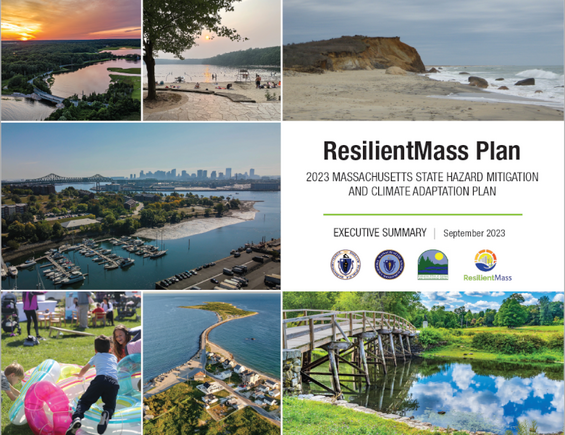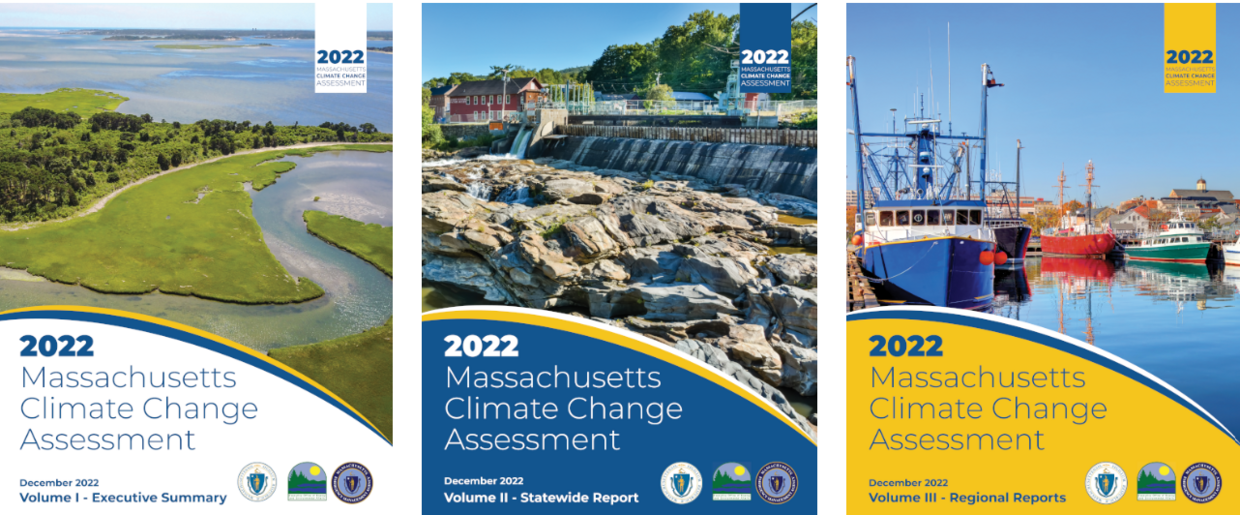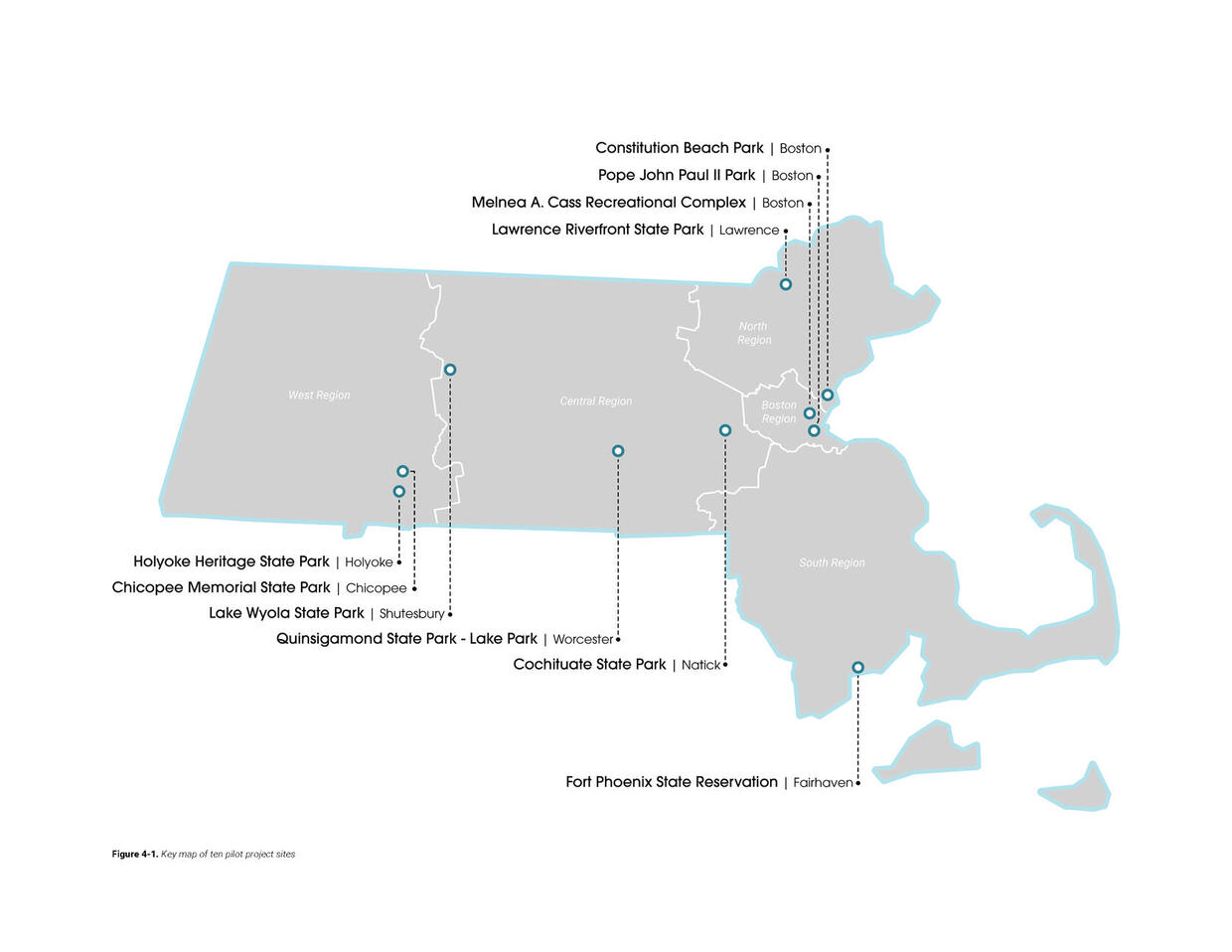ResilientMass Plan
The 2023 ResilientMass Plan is Massachusetts’ State Hazard Mitigation and Climate Adaptation Plan (SHMCAP). It was created with input from state and local agencies, experts, community groups, and other key partners. Building on the 2022 Massachusetts Climate Assessment and the 2018 SHMCAP, the Plan outlines clear, measurable steps state agencies are taking to protect people, communities, infrastructure, natural resources, and the economy from climate change-related risks. You can track progress on these actions through the ResilientMass Action Tracker.
The ResilientMass Plan also supports Massachusetts’ goal of being ready to withstand, respond to, and recover from all types of emergencies and disasters, while meeting FEMA requirements for federal funding before and after disasters.
Massachusetts Climate Change Assessment
The Massachusetts Climate Change Assessment is a statewide study that looks at how climate change could affect people, the environment, and infrastructure across Massachusetts through the end of the century. The science and findings from this assessment directly guide and inform the 2023 ResilientMass Plan.
Climate Resilience Design Standards and Guidance
The RMAT led the creation of the Climate Resilience Design Standards and Guidance project to help state agencies build climate resilience into their planning and investments. This project developed an online-decision support tool and guidance for including climate resilience in both state capital projects and local grants.
The Climate Resilience Design Standards Tool provides projects:
- An initial assessment of climate risks and potential impacts at the project site over its lifespan;
- Recommended climate resilient design standards for physical infrastructure; and
- Best-practice guidance to support implementation.
These tools are built on the latest climate science for Massachusetts and will continue to evolve as new data, changing climate conditions, and feedback from stakeholders become available.
State Agency Resilience Highlights
The RMAT is advancing climate resilience actions in many ways. Here are a few highlights:
- The Department of Conservation and Recreation (DCR)’s Project Shade intends to create a network of resilient and shaded gathering places across Commonwealth parks that provide safe, comfortable, and equitable outdoor spaces for all, especially vulnerable communities, during extreme heat events.
- The Department of Energy Resources (DOER) completed a comprehensive Vulnerability and Risk Assessment (VRA) of non-state energy infrastructure assets and critical facilities. This VRA established a clear methodology for identifying and ranking critical energy infrastructure across the Commonwealth’s key energy subsectors.
- The Department of Conservation and Recreation (DCR)'s Invasive Species Emergency Response Plan developed a decision-making framework and example Species Management Plans. They treated 153 individual ash trees from the invasive Emerald Ash Borer beetle, and 809 individual eastern hemlock trees from the invasive Hemlock Wooly Adelgid.
- The Department of Environmental Protection's (DEP) Wetland Mapping project will develop a mapping tool for climate coastal and inland wetlands to identify resource area vulnerability corridors.
- The Department of Conservation and Recreation's (DCR) Statewide Floodplain Regulatory and Coordination Framework coordinates state floodplain development processes, as well as state agency collaboration, for best floodplain management practices across the Commonwealth that considers climate change data and impacts.
- The Massachusetts Emergency Management Agency (MEMA) procured a vendor to assist several equity communities selected to participate in the “Local Hazard Mitigation Equity Program.”
You can view all ResilientMass state agency actions through the ResilientMass Action Tracker.
ResilientMass Plan Implementation, Actions, and Maintenance
The ResilientMass Plan is a living document that grows and adapts over time. It is updated as climate actions are carried out, new data becomes available, and feedback is gathered from partners and communities.
Putting the plan into action involves setting strategies, timelines, and priorities, while regularly reviewing and improving efforts based on progress and lessons learned. Because of this, many state agencies share the responsibility for carrying out the plan. Progress updates are available to the public through the ResilientMass Action Tracker.
To keep the plan current, the state conducts regular annual reviews, as well as after major disasters. A full plan review and update takes place every five years, with the next planned to be released in fall 2028. The RMAT also leads ongoing efforts such as tracking new best practices, policies, and procedures that can strengthen hazard mitigation and climate adaptation across Massachusetts.
Contact Us
For questions about the ResilientMass Action Team (RMAT) and its related ResilientMass Plan actions, contact rmat@mass.gov.


